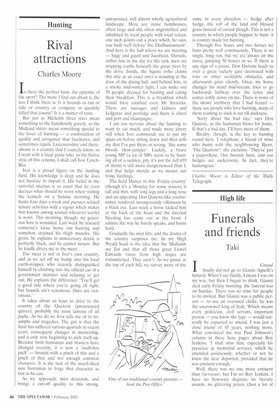Rival attractions
Charles Moore
Is there the perfect hunt, the epitome of the sport? The more I find out about it, the less I think there is. Is it hounds or run or ride or country or company or quantity killed that counts? It is a matter of taste.
But just as Michelin three stars mean something to the fastidiously greedy, so the Midland shires mean something special to the lover of hunting — a combination of quality and arrogance that fascinates, and sometimes repels. Leicestershire and thereabouts is a country that I scarcely know, so I went with a local guide who, in the fictive style of this column, I shall call Ivor LynchBox.
Ivor is a proud figure on the hunting field. His knowledge is deep and he does not hesitate to impart it. His belief in the sartorial niceties is so exact that he even decrees what should be worn when visiting the kennels on a Sunday morning. He hunts four days a week and pursues related leisure activities with a vigour which makes him known among women wherever scarlet is worn. This morning, though, my generous host is wounded. Last week he rescued someone's loose horse out hunting and somehow strained his thigh muscles. His groin, he explains in unnecessary detail, is perfectly black, and he cannot mount. But he kindly drives me to the meet.
The meet is not in Ivor's own country, and as we set off we bump into his local earth-stopper, who recently distinguished himself by climbing into the official car of a government minister and refusing to get out. He explains the difference: 'You'll get a good ride where you're going all right, but hounds ain't venomous. Ours are venomous.'
It takes about an hour to drive to the country of the Queivoir (pronounced quiver), probably the most famous of all packs. As we do so, Ivor tells me of its triumphs and tragedies. The gist is that the hunt has suffered various quarrels in recent years, consequent changes in mastership, and is only now beginning to pick itself up. Because both huntsman and masters have changed recently. it is now a 'snuff-box pack — hounds with a pinch of this and a pinch of that and not enough common character. It is the task of the much-liked new huntsman to forge that character as fast as he can.
As we approach, mist descends, and brings a cut-off quality to this strong, untouristed, still almost wholly agricultural landscape. Here are stone farmhouses, often large and old, often ungentrified and inhabited by local people with local voices: one such points out a place which, he says, was built well before 'the Disillusionment'. And here is the hall where we are meeting — huge and gaunt and Jacobean. Outside, rather late in the day for the task, men are stopping earths beneath the great trees by the drive. Inside, the Squire (who claims this title as an exact one) is standing at the door of the dining hall, and behind him, in a smoky mid-winter light. I can make out 50 people dressed for hunting and eating their breakfast. This is a breakfast which would have satisfied even Mr Jorrocks. There are sausages and kidneys and kedgeree and porridge and there is claret and port and champagne.
I am too nervous about the hunting to want to eat much, and made more jittery still when Ivor commands me to put my spurs on before sitting down and then tells me that I've put them on wrong, 'like some bloody show-jumper'. Luckily, a brave young MP (a lot of MPs seem to be hunting all of a sudden; pity it's not the full 659 of them) is still more inexperienced than I, and that helps morale as we mount our frisky hirelings.
The field Master in this 'Friday country' (though it's a Monday for some reason) is tall and thin, with long legs and a long nose and an appealing Don Quixote-like countenance rendered incongruously villainous by a black eye. Last week a horse kicked him at the back of the head and the internal bleeding has come out at the front. I admire the way he barely speaks, and hunts hard.
Gradually the mist lifts, and the drama of the country surprises me. In my High Weald head is the idea that the Midlands are flat and that all those great Lionel Edwards vistas from high slopes are romanticised. They aren't. As we pause at the top of each hill, we survey more of the same in every direction — hedge after hedge, the roll of the land and blessed grass instead of cursed plough. This is not a country in which people happen to hunt: it is country made for hunting.
Through five hours and two horses we hunt pretty well continuously. There is no single, long run, but we are always on the move, jumping 50 fences or so. If there is any sign of a pause, Don Quixote leads us over a great rackety gate decorated with wire or other avoidable obstacles, and afterwards grins silently. Once, my horse changes his mind mid-stream, tries to go backwards halfway over the fence and comes softly down on me. There is none of the showy snobbery that I had feared — these are people who love hunting, many of them wanting to stick it out till darkness.
`Sorry about the bad day,' says Don Quixote, as the huntsman blows for home. If that's a bad day, I'll have more of them.
Rivalry, though, is the key to hunting round here. I telephone a friend of mine who hunts with the neighbouring Bjorn. 'The Queivoirr she exclaims. 'They're just a paperchase. Our hounds hunt, and our hedges are suckeroony. In fact, they're humongous.'
Charles Moore is Editor of the Daily Telegraph.


























































 Previous page
Previous page